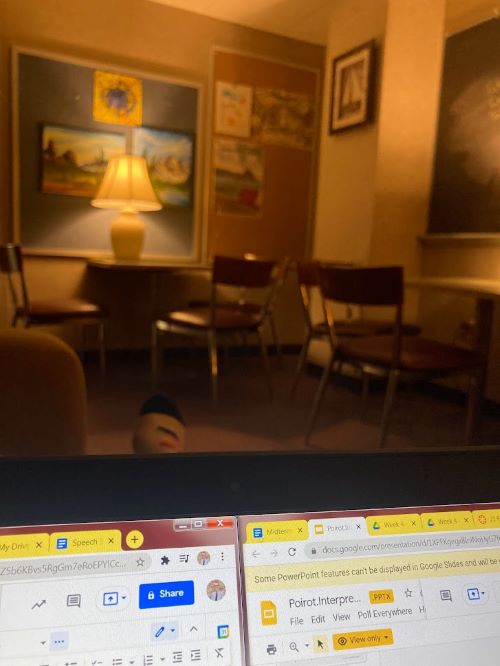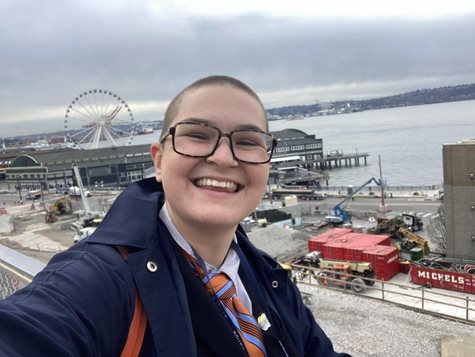May 2021
.png)
A Look Back: Professionalization Semester
Delaney Couri
The day-to-day life of a doctoral student.
Epigraph
I’m in a parking garage, walking circles around the second floor. It is August of 2020. I graduated college in May, started work on my master’s during the summer, and am 5 months into the COVID-19 pandemic. My girlfriend dumped me less than a month ago, I have no job, and am paying my own rent for the first time in my life. I’m walking the parking garage because, what else is there to do? I have an unhealthy relationship with exercise and it’s raining. I have nowhere to be and nowhere to go, so here I am. To pass the time, I think about what I want. Not in this moment, but in the life that awaits me once this moment has passed (I wonder; will it pass?). I ask myself, what will life look like in ten years if I get everything that I want? It’s a dangerous question, as passion and longing are never anything less. I envision it. The house. The person. The pet. The job… the job. What would I do if I could do anything? Phrased another way, who would I help, if I could help anyone? These are the questions that circulate, in my brain as in my feet as I make my way around the garage. When left to dream, I come up with this. I’ll study the way the church has harmed people like me. LGBTQ+ Christians. I’ll study what they’ve said and not said, what they’ve done and not done, and maybe then I’ll understand why they did it. I look out at my church as I make another lap. That’s it. That’s what I want.
One Year Later
At the beginning of each new academic year, my department holds something called “Professionalization Week.” Depending on who you talk to, it is either an exciting opportunity to reconnect with colleagues young and old… or, not. I believe the quote I once heard went something along the lines of, “It’s five days of hell.” As a new incoming student, my student mentors seemed excited and there was free lunch every day, so I was sold.
Except that I left out the context. Specifically, that I had worked with this department before extensively, but had never met most of my collaborators because of COVID. Or that, because of that same pandemic, I had not been in a large work, school, or social setting in over a year. Or that I am a giant introvert that does not always do well around crowds larger than two.
Now to be fair to my incoming colleagues, they had met no one at all and thus were as excited and anxious as I was watching the week approach. Until the night before, when, much to our surprise, we got an email, the subject line reading something like this, “Urgent- Professionalization Week Online!!!!”
With our new week online and no one to blame (but extensive texting conversations about which one of us has jinxed it by putting it in our color-coded calendars; hint, it was all of us, we’re in grad school for crying out loud), we turned our eyes to our Zoom screens with a collective sigh. My personal sigh was one of discontentment and relief, so I compromised with myself. I would do everything required of me on Zoom, but make sure to get to campus once a day to pick up my lunch and maybe wave at people and smile at them (from under a mask) before returning to my cave home with my cat.
And I did just that, coming in for lunch and Zooming the rest of the day, taking in what felt like years of knowledge in around 120 hours. On the second day of this information dump, I had a lunch planned with my advisor (whom I had never met) and her other advisees (one of whom I met the week prior, one who I had never met, and one I met about two weeks before). Needless to say, it went SO smoothly. Kidding, Reader, catch up and fill in the blanks. It was atrocious. There is no word in my academic or even colloquial vocabulary that I know that could sum up how horribly I acted and reacted around four people who were just trying to make me feel welcome.
To make matters worse, I ran into not one, but two other very important people picking up lunch: a woman who I had worked with for a year but never met in person (“She’s so tall!” was all I could think) and someone who became my professor and one of my favorite people in the program. I completely froze up with them too, to the point that I felt so awful later that night that I felt compelled to send not one, but five different apology letters. “Sorry that I said nothing/stared blankly at you/acted a fool…” What first impressions I made on people I now call friends, colleagues, and mentors.
I would like to tell you that things improved after this point. That once I made these apologies and amends, all was better. Unfortunately, my writing is one place where I try to always tell the truth, so truthfully, things did not get better. Professionalization Week ended and I felt less assured, confident, and “professional” than I ever had before. That did not stop the semester from starting, and start it did, with a series of minute tragedies, Zoom calls, early mornings, and tearful phone calls. We were in it, for sickness or health, worse or better, indoors or outdoors (in taco chairs), rain or shine. For weeks it went on like this.
What does “telos” mean and why is it in the title of three articles this week?
Who is Burke and why do we not like him?
What does Aristotle have to do with this?
How do you spell that, “e-n-t-h-y-m-e-m-e”?
Now that I can spell it, remind me what it means?
You’re on mute.
He/she/they are sick today.
Class is canceled.
What does “ontological” mean and what does it have to do with the chairs in my class?
How are your readings going?
Here are your spring teaching assignments.
What did we think of this reading?
Clearly, that is post-positivist, not even close to the interpretivist paradigm.
Who are we waiting on?
Can you hear us?
Any questions?????
Within the first two months, we weathered more than just rain or shine. I lost count of the number of times tears were shed in my office, my own and those of a friend. What are we doing here? One of our cohort members decided that this was not where she was meant to be (if you are reading this, we miss you every day). There were birthdays. Illnesses. Edible arrangements were sent at the loss of a pet. Mysterious absences and GroupMe check-ins, “You weren’t in class; are you alright?”
For week after week, I showed up, a child in an adult’s body, teaching other children, learning from slightly more adulty adults. I didn’t think I could do it. These weeks were what I call “if”’ weeks. If I can get these readings done. If I can make it until December. If I am good/smart/strong/resilient enough. Professionalization week was just the first of many “if” weeks. The first five were all “ifs.” Ask me in Week 3 if I thought I would still be here in Week 4, my honest answer would have been, “I don’t know.” This continued, again, and again until…
One day, it broke. Not like a bone, but like a fever. A break for the good. One day, suddenly I started referring to ontology in my arguments. Referenced McKerrow like he was an old friend. Pronounced epistemology without stumbling. Wrote my first footnote.
Suddenly, it clicked. Now, future events have become a “when” rather than an “if.” When I am done with finals. When I choose my advisor. When I finish my comprehensive exams.
Although this shift from “if” to “when” has been overwhelmingly positive, it has also brought with it its own set of challenges as I grapple with a loss of purpose and the difficulties that come with forgetting how I got here in the first place. Yes, I can do it. I can reach these milestones… but do I want to?
It is just like anything else. As soon as you are accepted to the program, get the big job, or start a new family, there’s that joy of just having it. The wonder that your work paid off and now you are in the honeymoon phase. Doe-eyed and enthusiastic, you move through life like a child who is pleased by the new rock they found on the playground. Whatever it is you have, it is YOURS and no one can take it from you. This is how I felt in February when I found out that I was accepted into the program.
And then Professionalization Week came, and the work started, and I lost that spark. I forgot about the feelings I had when I was applying last December. The feeling that I wanted it so badly that I could sense it in my stomach and deep in my chest. That wave of overwhelming desire that seemed to take over my whole body – it was gone and replaced by pure survival. All the excitement, the passion, the joy that I felt at the beginning was gone – is gone.
Now that I feel like I can handle it (feel being the ideal word here) the question again arises; What am I doing? When did I want this? I think I wanted this at some point, right? This is what I wanted? I have been living this for months, getting so lost in the day-to-day struggles that I forgot to hold on to my passion, leaving me with two choices: to find a way to remember the feelings that drove me to end up here… or move on.
The question is now no longer if I can. It is if it's worth it. If I want to. If it's right for me. I have gone through many programs that were wrong. I have ignored my gut and rushed into things enough times that I now have a hard time trusting that small voice.
But then I think back to the epigraph of this blog post (Did I use that right, professor?! Is my epigraph too long??). I remember back to that time in August 2020, walking around that lonely parking garage, wondering, what will become of me?
When I did that, in August 2020, I didn’t know TAMU had a Communication Department. I didn’t know what rhetoric was. I had never heard of queer theory. Women and gender studies were no more real to me than the tooth fairy. Yet, a few happy accidents (Blessings? Fate? Kismet? Acts of God?) later, I ended up applying to the program I am in now, studying exactly what I dreamed up that day in the parking garage. And, for the first time in my lifetime, I am convinced the future will take care of itself… as long as I take care of myself here and now. As long as I keep reading, keep learning, keep growing.
To quote my dear professor AW, “Delaney has a lot of interests that will probably bring them into many of your offices this semester.” And I have and I will. Until this professionalization semester is over. Until this professionalization program ends. I will keep knocking. And then, maybe one day, someone will come knocking on my door, and the cycle will repeat itself again: a family of scholars, practitioners, people, all working to change the world.
